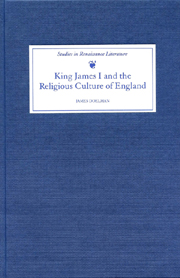Book contents
- Frontmatter
- Preface
- Chapter 1 BEGINNINGS: THE ROOTS OF JAMES' ROLE IN RELIGIOUS CULTURE
- Chapter 2 THE ACCESSION OF KING JAMES I AND ENGLISH RELIGIOUS POETRY
- Chapter 3 PROPHETS AND THE KING
- Chapter 4 KING JAMES, ANDREW MELVILLE AND THE NEO-LATIN RELIGIOUS EPIGRAM
- Chapter 5 FROM CONSTANTINIAN EMPEROR TO REX PACIFICUS: THE EVOLVING ICONOGRAPHY OF JAMES I
- Chapter 6 KING JAMES AND THE POLITICS OF CONVERSION
- Chapter 7 THE SONGS OF DAVID: KING JAMES AND THE PSALTER
- Chapter 8 THE DEATH OF SOLOMON
- WORKS CITED
- Index
Chapter 1 - BEGINNINGS: THE ROOTS OF JAMES' ROLE IN RELIGIOUS CULTURE
Published online by Cambridge University Press: 05 February 2013
- Frontmatter
- Preface
- Chapter 1 BEGINNINGS: THE ROOTS OF JAMES' ROLE IN RELIGIOUS CULTURE
- Chapter 2 THE ACCESSION OF KING JAMES I AND ENGLISH RELIGIOUS POETRY
- Chapter 3 PROPHETS AND THE KING
- Chapter 4 KING JAMES, ANDREW MELVILLE AND THE NEO-LATIN RELIGIOUS EPIGRAM
- Chapter 5 FROM CONSTANTINIAN EMPEROR TO REX PACIFICUS: THE EVOLVING ICONOGRAPHY OF JAMES I
- Chapter 6 KING JAMES AND THE POLITICS OF CONVERSION
- Chapter 7 THE SONGS OF DAVID: KING JAMES AND THE PSALTER
- Chapter 8 THE DEATH OF SOLOMON
- WORKS CITED
- Index
Summary
JAMES Stuart arrived in England in 1603 with a well-developed under-standing of the role of a king in the religious life of his kingdom. This understanding had two prime sources: the Protestant understanding of the Bible as it related to kingship, and his experiences as a young king of Scotland. The Scottish reign not only affected James' own view of his role, it also developed expectations among the English, as they looked to the church and court of Scotland for a model of what they themselves might expect in 1603.
In his opening speech to the Hampton Court Conference of 1604, James said “It is no novel device, but according to the example of all Christian princes, for kings to take the first course for the establishing of the church, both in doctrine and policy. To this the very Heathen related in their proverb, A Jove principium.” This motto sums up well his understanding of the king's role in religious life. This, however, was only one strand of thought within Christendom: in the fourth century Donatus had rhetorically asked: “What has the Emperor to do with the Church?”, and many since had answered, “nothing”. British Christians of the early seventeenth century might look to a number of different eras for a model of the relation between a ruler and the religious life of the state: Old Testament Israel, the early church under the Roman emperors, and the customs of the medieval church.
- Type
- Chapter
- Information
- King James I and the Religious Culture of England , pp. 7 - 19Publisher: Boydell & BrewerPrint publication year: 2000

